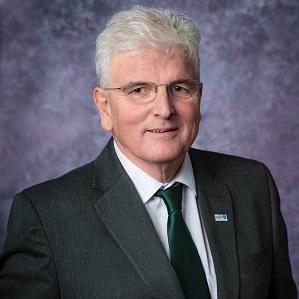Thank you very much for the kind introduction, Frank. I am delighted to be here with you and Rose and the team from the U.S. State Department, along with my colleagues from the Nuclear Threat Initiative – and I am particularly pleased to see that representatives from 25 states have gathered here in Washington for this International Partnership kick-off meeting. Everyone in this room knows that given what is happening on the world stage, this is not an easy time to form international partnerships. At the same time, we all understand that reducing the threats posed by nuclear weapons and materials requires cooperation among states. So I want to give a special thanks to all of you for being here. I believe your presence is testament to your dedication to what is clearly a difficult – but absolutely necessary – task for the future of global security.
That we are here to collaborate on building capacity for verifying future arms control and nonproliferation agreements also is testament to the leadership provided by the State department. The fact is, when it comes to matters of international security the world looks to the United States for leadership – and time and again the U.S. has responded, particularly when it comes to nuclear security. From long-term contributions to a host of multilateral institutions, including the International Atomic Energy Agency, to billions of dollars of investments in securing global nuclear stocks over the past two decades to the Nuclear Security Summit process initiated by President Obama, the U.S. has led the way. And I am quite comfortable saying so, despite having served in the top ranks of another government.
Today, I speak to you wearing a relatively new hat: as Vice Chairman of the Nuclear Threat Initiative. In founding NTI, Senator Sam Nunn – responsible himself for so much groundbreaking work and innovative thinking in this field – created an organization that would engage in hands-on projects and serve as a catalyst for bold and innovative thinking. This International Partnership is borne of NTI’s understanding that strengthening the verification and enforcement capabilities of governments worldwide is the very foundation upon which the disarmament platform rests.
So we at NTI could not be more pleased to be walking with the State Department on this journey toward developing global verification capacity, and we are humbled by the presence of everyone here tonight. A multilateral verification project lead by the United States is, in fact, the stuff of my dreams. Let me explain.
As someone who fundamentally believes in disarmament, I was an improbable choice when I was named U.K. Defense Secretary in 2006. But I made a deal with myself: I would take responsibility for the UK’s nuclear weapons, but I would work to reduce the dangers posed by them.
To that end, I traveled to Geneva in 2008 to send a strong message as the first-ever defense minister to deliver an address at the United Nations Conference on Disarmament. It was as clear then as it is now: the world needs a transparent, sustainable, and credible plan for multilateral disarmament. And central to the success of such a plan would be the development of an effective and mutually trusted verification regime.
It was during this period that a quartet of U.S. statesmen – George Shultz, Bill Perry, Henry Kissinger and Sam Nunn – offered their vision of a world without nuclear weapons and an agenda, in the form of a series of steps, to build that world. Strengthening verification and treaty enforcement capabilities was one of those steps.
The U.K., meanwhile, also was engaged on the issue of verification and in 2007 had begun work under the U.K-Norway Initiative to build joint capacity on nuclear weapon dismantlement verification. The collaboration between nuclear weapon states and non-nuclear weapon states for this purpose made it the first project of its kind, and it was part of a range of activities being undertaken to enhance technical knowledge, particularly of non-nuclear weapon states, on issues related to disarmament. The activities continue today, and I am proud to say my home country is now something of a "disarmament laboratory," to borrow a phrase from my friend, the former British Foreign Secretary, Margaret Beckett.
Since the U.K.-Norway project began, we have made tremendous progress on developing jointly trustable equipment, testing inspection procedures for nuclear weapon verification and examining how relationships – what we often call “human factors” – can influence methods and outcomes. The bilateral project is an exemplar of international cooperation and, I believe, has paved the way for the work we are engaged with today.
Now, let me acknowledge a few a things.
1. One: The U.K.-Norway initiative, as groundbreaking as it was and as successful as it has been, addresses warhead dismantlement – just one key piece of the very large puzzle being tackled by our new International Partnership.
2. Two: Monitoring nuclear warheads is an enormously sensitive topic and the work ahead through this Partnership will be extremely challenging.
3. Three: It comes at a particularly precarious moment with respect to the outlook for progress on issues related to nuclear weapons and security. Prospects for progress at the upcoming NPT Conference are dim and tensions across the Euro-Atlantic region are higher than they have been in a generation. There’s no question that much of our agenda is stuck and relations between key countries are strained.
With that said, it is important to remember that we will not always be in this moment. Events in Ukraine remind us that the global security landscape can change unexpectedly and almost overnight – and fortunately, history has shown us it can sometimes change for the better. That’s why we must engage now. Sustained technical collaboration builds broader understanding and prepares us for the day when the global security landscape will change to favor our work and the work predicated by the NPT. If we have laid the groundwork, verification can be an engine for disarmament, not the brake.
Lastly, we look forward to getting your input and ideas on priorities and activities. As you prepare to move forward, I’d like to give you my personal set of objectives and challenges for the Partnership.
I realize – as I know you do as well – that this is a cooperative effort and that it will not work if we don’t listen to each other. That’s what makes for a genuine partnership. While you’re working together this week and in the months and years to come, you may come to understand and accept each other’s expectations and capabilities. But you will all have to return to your own domestic political environments where you will most certainly hear calls for certain concessions and modifications to your work. Don’t become disillusioned – after all, this work is all about collaboration and compromise. But remember that as Frank and others have said today, we need to accomplish at least the following – or we will fail:
1) We need to take steps to increase capacity. This is fundamental.
2) We must build broader understanding around the nature of the challenges. Some of us understand that it’s a bit like the allegory of the mongoose and the snake. The challenges to developing verification capabilities have been held up by some as insurmountable and thus used to justify inertia. But we know there is every reason to be unimpressed by the size of the task ahead. We are here because we know it is possible to build this capacity – and we should rebut those who say it can’t be done.
3) Most of all, and in keeping with my previous point, we need leadership. We leaders who can take others to places they would not have gotten to on their own. As Nathan Myhrvold says: "If you see a parade going down the street and you run up in front of it, they’re not actually following you." With this work, you are putting yourselves in position to lead the way with fresh thinking, a willingness to cooperate and a determination to play a role in building a safer world.
Let me conclude by saying that for far too long, the international community has shied away from the responsibility of confronting the verification challenges that come with disarmament. For far too long, we have talked about multilateral disarmament without developing the tools that will actually get us there.
Today, you are taking action. Today, you are taking a bold step toward building global verification capacity that will ensure that future disarmament efforts are both credible and irreversible. Bring your very best to the table. Share your bold ideas. Listen to each other, be honest and be open to new ideas. I know you will do well.
Thank you.

